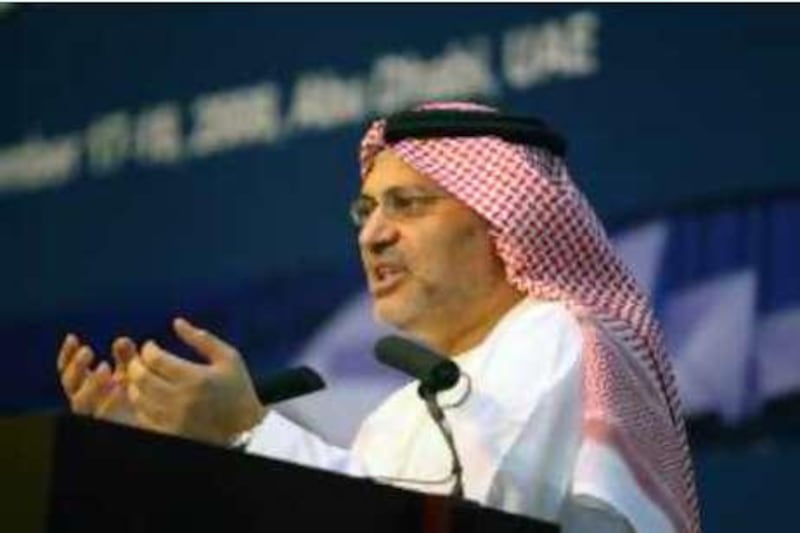ABU DHABI // Stability, development and tolerance form the basis for strengthening the relationship between the UAE and Australia, senior figures from both countries said at a conference on Australian-Arab relations yesterday. Dr Anwar Gargash, Minister of State for Foreign Affairs and keynote speaker at the opening of the conference, named those three driving principles behind UAE policy, while Australian academics agreed that the approach had bolstered trade, education and political relations.
The UAE has engaged with Australia on a political level on several regional issues including Iraq and the occupation by Iran of the islands of Abu Mousa, Greater Tunb and Lesser Tunb, Dr Gargash said. "It is time to resolve the Arab-Israeli crisis peacefully and we also need a stable, unified Iraq. Our recent actions have included reopening our embassy and cancelling all of the debt" in Iraq, he said. "The same pattern of logical thinking goes to Iran. We have a neighbourly relationship where there are many areas of similarities and some disagreements."
Of Iran's nuclear programme, Dr Gargash said the Islamic republic needed to clarify it was complying with the International Atomic Energy Agency to ensure the programme was peaceful. Despite the vast geographic distance between the UAE and Australia, development drives the Australian-Emirati relationship, he said, encouraging other Arab states to forge stronger ties with Australia. But, more could also be done on a multinational level, he added, citing ongoing negotiations on a free-trade agreement between the GCC and Australia.
"What Australia and the UAE have done together is to build a viable relationship based on mutual interest, despite continents, oceans and seas between us," he said. "The relationship is promising but has not peaked yet. There is still lots to do." Dr Gargash also spoke of the current economic crisis, which has exposed just how interdependent the world is. "It makes us realise how small a village we are, how much we depend on all the other regions of the world," he said. "The UAE is one of the few countries blessed with substantial natural assets that may cushion us from the worst effect, but times remain difficult. Thus we must try to predict how these events will unfold. We only know that the next year will be more difficult than the current one."
An Australian embassy was opened in the capital only in 1999 and in recent years stronger ties have been forged with Gulf nations, the UAE in particular. Tourism is one of the main factors driving growth, according to speakers at the conference, and there are now more than 250 flights on UAE national carriers every month to Australia. About 34,000 Emiratis visited in 2007. The UAE is Australia's largest trading partner in the region and according to Australian government figures, this year the UAE moved up to become Australia's 13th-largest market, with trade in the billions of dollars.
Educational ties are also strong. More than 1,500 Emiratis study in Australia. The Australian expatriate community in the UAE is estimated at between 15,000 and 20,000. The first day of the two-day symposium, organised by the Emirates Centre for Strategic Studies and Research and the University of Melbourne, also included discussions on Australia's strategic interests in the region and lessons learnt from Iraq.
Speakers included Prof Bob Bowker, a former Australian ambassador to Egypt, who said that while Australia and Arab states no longer "meet as strangers", there was always room for more discussion. "We are all connected," he said. "There is much to be gained by working together." Prof William Maley, the foundation director of the Asia-Pacific College of Diplomacy, referred to the close relationship between Australia and its principal ally the US, which many regarded under the previous government led by John Howard as "too close".
Australia was criticised across the region when it took a key military role in Iraq after the US invaded in 2003. However, Kevin Rudd, the Australian prime minister who came to power late last year, has withdrawn the country's main combat forces from Iraq - one of his key election promises. While the US-Australia relationship is unlikely to end, there are other signs that it may be shifting, Prof Maley said. They include Australia's UN General Assembly vote last month for a resolution calling on Israel to stop building settlements on occupied Palestinian land, and another calling for the application of the Geneva Conventions in the Palestinian Territories.
Under the Howard government, Australia had voted with the US against any perceived anti-Israel resolutions, along with Israel, the US Marshall Islands, Nauru, Palau and Micronesia. zconstantine@thenational.ae






